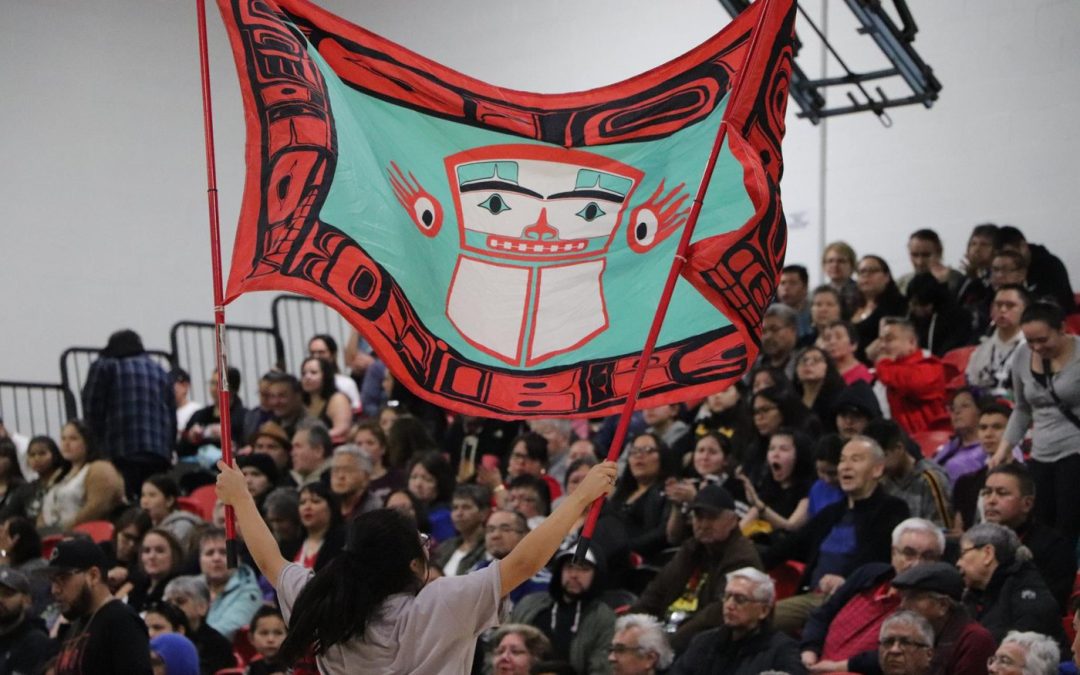Photo: A member of the Lax Kw’alaams Nation waves their band flag during a community gathering in British Columbia / Photo credit: Lax Kw’alaams Band, via Facebook
By Sonal Gupta
Local Journalism Initiative Reporter
Canada’s National Observer
An Indigenous band in BC wants a 2002 land claim settlement overturned and is demanding $150 million in compensation from the federal government.
Central to the dispute is the Tsimpsean Indian Reserve No. 2, historically shared between the Lax Kwalaams and the neighbouring Metlakatla Nation. According to the statement of claim, government officials unlawfully divided the reserve in 1888, granting approximately 47,000 acres of its southern portion exclusively to the Metlakatla — without the consent of the Lax Kwalaams.
“Our people have lived in the Prince Rupert area since time immemorial,” Garry Reece, mayor of the Lax Kwalaams, stated Monday in a press release announcing the band has filed a court challenge. “Canada’s actions in the late 19th and early 20th centuries — and again in 2002 — deprived us of our land and our rightful compensation. We are asking the Court to make these wrongs right, in keeping with Canada’s commitment to reconciliation and the United Nations Declaration on the Rights of Indigenous Peoples.”
The Lax Kwalaams Indian band, based near Prince Rupert and representing more than 4,100 members, claims the 2002 settlement compensating them for past land losses was deeply flawed. They say the government withheld critical information and failed to adequately represent their interests during negotiations.
Christopher Rusnak, the lawyer representing the band, told Canada’s National Observer this case reflects a broader trend that shows how Indigenous groups are using archives to expose past rights violations.
“With greater access to historical information, First Nations are revealing previously unknown past injustices,” Rusnak said.
He said in 2002, the Lax Kwalaams believed they had all the necessary facts to settle their claim regarding the wrongful taking of their lands. “But information identified more recently indicates there were additional historical wrongs about which Lax Kw’alaams were not aware,” he said.
The statement of claim details how the federal government facilitated the sale of much of the disputed lands to the Grand Trunk Pacific Railway (GTPR) in the early 1900s. The railway, a major infrastructure project aimed at linking Canada coast to coast, was granted access to reserve lands under a 1903 agreement where Canada guaranteed bond payments for financing and agreed to transfer any vested reserve lands required for building the railway’s western section.
Between 1906 and 1907, about 13,500 acres of the southern reserve were surrendered by the Metlakatla to the railway for $7.50 per acre — a value the suit says was never properly assessed and significantly understated. Additionally, the claim states the government illegally sold an extra 641 acres of land to the railway without the consent or authorization of either Indigenous group.
Under the 2002 settlement, the Lax Kwalaams received $17.75 million in compensation, including negotiation costs. The band argues that amount is inadequate, especially compared to a recent $150-million settlement paid to the Metlakatla for similar claims.
Reece said the band seeks fairness, not confrontation, and expects treatment like that given to the Metlakatla. “We expect nothing less,” he said. “We want to work with Canada to resolve this matter honourably, in the spirit of reconciliation and fairness.”
He pointed to the unequal bargaining conditions during the original settlement. “We entered into the 2002 agreement without full information and under conditions of unequal bargaining power. We are determined to ensure our community receives the justice and compensation we deserve.”
Rusnak said the case will be decided in court and, therefore, he could not comment on the specific arguments or outcomes.
“What we can say is the courts will be asked to decide these questions — including the validity of the 2002 settlement agreement and related claims — and we respect that process,” he said.
The claim also requests costs, pre- and post-judgment interest and referral of the matter back to the Specific Claims Tribunal for reconsideration.
Crown-Indigenous Relations and Northern Affairs Canada was contacted for comment on the allegations and whether Canada plans to contest the claim. “The Federal government settled this specific claim with Lax Kw’alaams Band in March 2003. We will review the statement of claim filed in Federal Court to determine our next steps,” the department responded.
